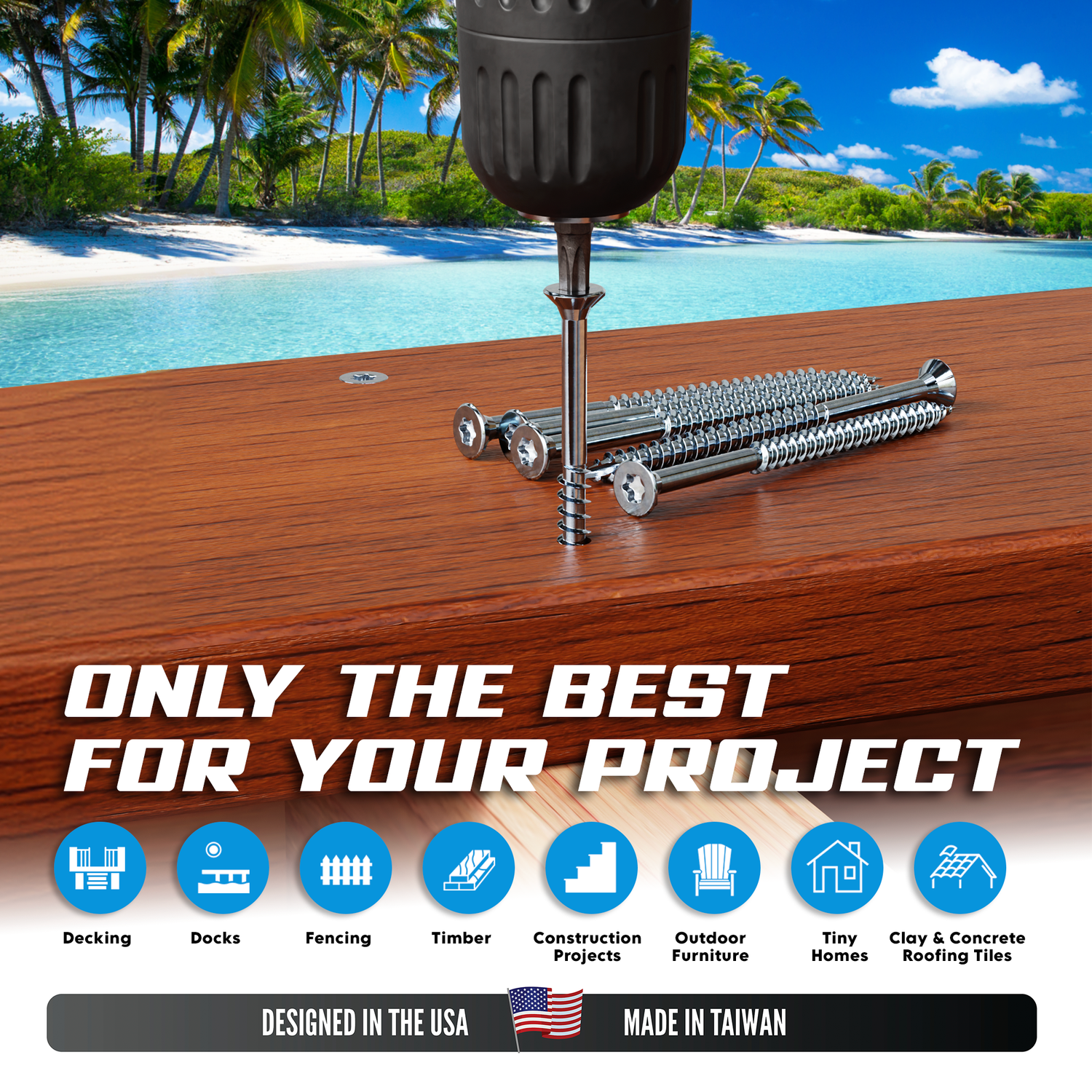
7 Common Mistakes to Avoid When Choosing Fasteners
Share
When you're working on a project at home, like putting up shelves, building a raised garden bed, repairing a deck, or putting together a decorative box, one big question usually comes up: What type of fastener should I use?
It can be confusing to navigate through all the different sizes and types, trying to figure out which ones are truly important for everyday tasks. Having the right fasteners ready can help make sure your work looks great and lasts a long time.
No matter if you're doing your first DIY project or you've been into woodworking for a while, knowing which screws to use for any material can save you time and frustration.
Here are the common mistakes to avoid when selecting fasteners so you can always have the right tools ready for whatever task you’re taking on.
Not Choosing the Right Type of Screw Head

Screw heads come in all sorts of shapes for different jobs and uses. Here’s a rundown of the most common screw heads you might come across:
Flat Head Screws: These fasteners come with a beveled head that sits nicely into the material, giving you a smooth, flush finish. For the best results, make sure to drill a countersink hole for the screw so it fits nicely into the wood.
Pan Head Screws: These screws come with a low, rounded head. They're not that popular in woodworking, but they can come in handy for connecting materials like metal or plastic to wood.
Round Head Screws: They are similar to pan heads, but they’ve got a deeper dome shape. They don't really get used a lot in woodworking projects, either.
Don’t forget to match the screw head to your desired finish. If you need a flush finish, go for flat-head screws and use a countersink.
Ignoring Thread Size and Type

Screws come in different thread sizes, and the thread type matters depending on the material you're working with:
Coarse threads: These work best with softwoods and plywood. Coarse threads have deeper threads that grip softer and more flexible materials better.
Fine Threads: These work great for hardwoods. Fine threads provide a tighter grip and prevent the screw from pulling out of dense materials.
The number on the screw box, like #6, #8, or #10, refers to the screw's diameter. The bigger the number, the thicker the screw will be. If you're tackling a woodworking project, consider using a smaller screw with finer threads for detailed work. For bigger projects or when working with softwoods, coarse threads will work just fine.
In airtight or watertight joints, the number of threads is crucial for making sure that the fastener holds materials together securely and tightly. For instance, when building decks, docks, or jetties that are often exposed to rain or water, using screws that have more threads helps make a tighter seal. This stops water from getting into the structure and causing rot.
Using the Wrong Screw Length
Using a fastener that’s too short won’t secure your materials properly, while one that’s too long can create unnecessary stress on the surrounding materials.
You want enough length to secure both materials together tightly without leaving parts loose.
The general rule of thumb for selecting screw lengths is: The length should be approximately three times the thickness of the timber being fastened to the substructure or framing. So, the correct length screw to use when fixing a 1” deck board is 3”.
This length ensures that you don’t accidentally go all the way through both pieces, which could ruin your project.
On the other hand, if you’re working on a butt joint, like assembling cabinets, inch-and-a-half screws might be your go-to. They provide enough length to secure pieces together without compromising strength.
Using the Wrong Drive Type

There are several types of drives, each designed for specific tools. Here are the most common types:
Slotted Screws: You have to be very patient to drive them with power tools, especially drills and impact drivers. You have to be very patient to drive them with power tools, especially drills and impact drivers.
Phillips Screws: These screws have a cross-shaped slot, which grips the driver better than those slotted screws do. Even though Phillips screws are pretty common and were a big step up from older designs, they can still cam out (slip off the driver), causing frustration.
Square Drive (Robertson) Screws: They are definitely a step up from Phillips screws. They don’t slip out easily. They work really well for high-torque applications and are commonly used for pocket screws.
Star Drive Screws (Torx): The star-shaped drive offers the best grip, eliminating cam-out and slipping. They can handle a lot of torque. When you buy Eagle Claw wood screws, you'll get a driver bit with every box.
Not Using Screws with the Right Tip for the Job
Construction screws often have a Type 17 tip, which is like a self-drilling tip. This shape helps cut into the material, which makes the process faster and smoother. But the tip you need will depend on what you're using it for.
For example:
Self-drilling screws are ideal for softer materials or when you need to create your own hole.
Standard screws might not work as well in certain materials and could lead to the wood splitting or the screw getting stripped.
Choosing the Wrong Fastener for Weather Conditions

If you’re in an area that experiences a lot of rain, snow, or other harsh conditions, you’ll want fasteners that can withstand the elements without rusting or deteriorating.
Here are a few fastener options that can handle harsh conditions:
Coated Screws: Common coatings are zinc, ceramic, or epoxy, which create a protective layer between the metal screw and the environment. If you drive coated screws too hard or use the wrong tool, you could damage the coating. When the screw is exposed, the material at its base can get wet, and this can cause rust to form over time.
304 Stainless Steel Screws: They offer strong corrosion resistance and work well for many outdoor uses, especially in places with mild weather. But 304 stainless steel screws might not be the ideal choice for highly corrosive environments, such as marine applications.
316 Stainless Steel Screws: If you’re doing projects close to the ocean or in places with a lot of saltwater, 316 stainless steel screws are the best option. They provide excellent protection against rust, making them ideal for marine docks and jetties.
Using the Wrong Fastener for Structural Projects
A common mistake is choosing the wrong fastener for heavy-duty projects. If you're building something that has to support weight, such as beams or posts, you definitely have to use structural fasteners. These fasteners are made to hold things securely together with the strength and toughness needed for the task.
Be sure to choose a fastener that's designed for the weight you're dealing with. This is super important if you want your structure to stay strong for a long time without any issues.
Don't Settle for Anything Less Than Eagle Claw Stainless Steel Screws
Choosing the right screws for your project isn’t just about picking up a box of random screws from the hardware store. By understanding the different screw types, lengths, tips, and drive types, you can ensure your project will hold up strong and look professional.
By avoiding these common mistakes, you’ll ensure that your project is solid, secure, and built to last. If you’re ever unsure, don’t hesitate to ask the experts at Eagle Claw Fasteners for advice on selecting the right fasteners for your specific needs. The right hardware can make all the difference in the long run.


